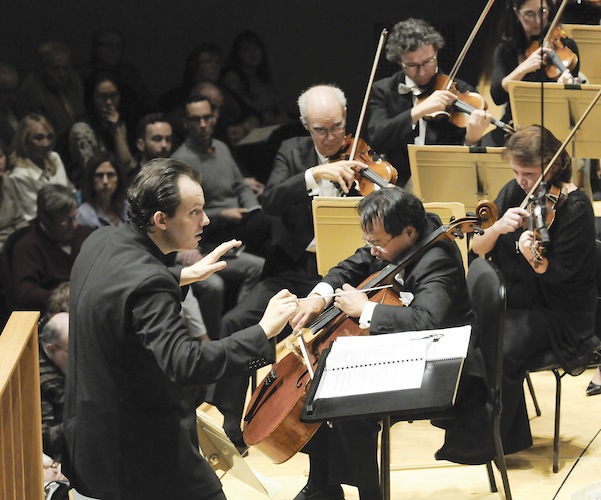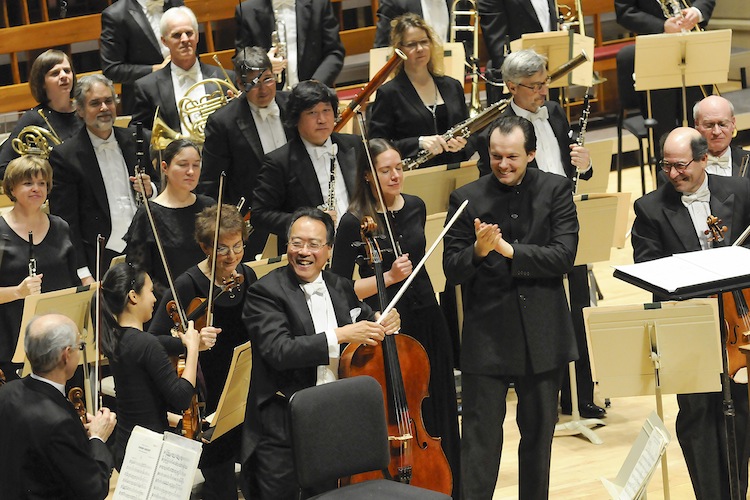Concert Review: The Boston Symphony Orchestra Looks Abroad
This was was a truly memorable afternoon at Symphony Hall, filled with interesting programming decisions and exciting revelations.

Yo-Yo Ma and Andris Nelsons with the Boston Symphony Orchestra. Photo: Stu Rosner.
By Cashman Kerr Prince
The Boston Symphony Orchestra, amassed with the Tanglewood Festival Chorus, Yo-Yo Ma, and three vocal soloists making their Boston debut, all under the baton of Andris Nelsons, warmed audiences as they presented an innovative program connecting American, Latvian, and Russian musical traditions.
The program opened with John Harbison’s Koussevitzky Said: Choral Scherzo with Orchestra (2012). This very Bostonian work is a musical setting of memorable lines from Serge Koussevitzky. Originally commissioned to round out a program with Beethoven’s Ninth Symphony, this work is scored to correspond exactly to that larger piece. The plucky opening starts us on a modern excursus in counterpoint, first instrumental, then vocal. As the choral part’s repetitions and layers grow, the words lose their meaning, until the end of the first movement when we hear clearly the line “I will keep playing this music—until you hear it.” The second movement begins attaca with a chorale that recalls those of Barber and Copland, its words emphasizing Koussevitzky’s own conflicting ties to Russia and America. The continuous musical lines reinforce the continuity of tradition. The third movement exhorts the musicians to give their all; pointy, biting music matches the words and rapid, scurrying figures in the strings reinforce the perils of playing out of tune or cheaply or incorrectly. In this context, the cry “play it from your hearts” beame more a shout than a plangent plea. The composition ends by repeating the opening text, “The next Beethoven will from Colorado come,” with a Hollywood flourish of brass and drums. Harbison (who is from New Jersey) places himself into an august musical lineage in this piece — they are outsized shoes to fill.
We looked next to Latvia with Ēriks Ešenvalds’s Lakes Awake at Dawn for mixed chorus and orchestra (2014; world premiere of a co-commission between the BSO and the City of Birmingham Symphony Orchestra). The composer describes the piece as “a picture of one’s emotional unrest, anxiety, and physical running away from danger at night in a forest” at dawn reaching the sanctuary of a lake. The work lasts ten minutes: the first movement is set to a poem by the Latvian poet Inga Ābele (in the English translation of the Canadian Edita Page); the second movement features a complementary text by the composer. “Lakes Awake” opens with timpani and a cloud of strings before the chorus voices their disquiet. The music builds in intensity, then loses steam as the voices glide down in pitch and the strings slide through the harmonic series. The effect is of a foggy scrim. There is a moment’s repose before the second movement begins in lush and neo-romantic fashion with the oboe and English horn taking up a chorale. The darkness of the music counterbalances the words, which strive for light. The text embarks on a prayer that combines matins and evensong – the music retains a fluttering mien that recalls the opening. Beautifully atmospheric and fluid, this tightly organized piece strikes an astute balance between singers and orchestra. Ešenvalds is a major voice, and Lakes Awake at Dawn is a lovely addition to the canon. I hope to hear much more of his music in Boston. Until then, readers can learn more about him from his website, which includes audio clips and information on recordings of his compositions.
Following a slight pause to re-set the stage, Yo-Yo Ma appeared with Nelsons and the BSO for Prokofiev’s Symphony-Concerto for Cello and Orchestra, op. 125. Finalized in 1952 shortly before the composer’s death, this is a reworking and a definitive restatement of his earlier cello concerto composed between 1933 and 1938. The three-movement work is substantial and owes its existence, as well as much of the solo cello’s sound-world, to Mstislav Rostropovich, who urged Prokofiev to finish this composition, offering physical support and musical inspiration. Because of the lengthy compositional process, and Rostropovich’s knack creating the rich and various sounds of the orchestra through the solo cello, this is a multi-faceted piece. It requires technical prowess and intense stamina from the soloist.
The Andante opens with a spiky ostinato establishing us in the realm of E minor, over which the soloist presents a lyrical and pensive theme in contrast to the orchestral announcement. The second movement serves as the major body of this work and it passes through several personalities, belied by the single tempo marking of Allegro giusto. At times a playful scherzo, the opening could almost be a cartoon march in the vein of Shostakovich’s The Golden Age. Then it slows down and becomes music of an intense longing, à la Samuel Barber. A fiendish cadenza (the second of this movement, and both handily dispatched) leads into frenetic music, then a lullaby accompanied by effervescent harmonics before returning to a playful spirit. The third movement opens Andante con moto with a lyrical theme, this time in E major, which serves as the basis for a series of variations. The middle Allegretto section quotes a popular Belorussian song (a political riposte to the composer’s critics), then bends it into klezmer style before transforming it into a grotesque parody (critics dispatched). This deformation sounds at times like a march of lumbering elephants with their comedic efforts at grace. The Allegro marcato section brings us to a funereal full-orchestra chorale before a furious coda closes the composition. Yo-Yo Ma began his performance sounding forced (there was quite a delay before he walked on stage; perhaps there was an unsettling problem backstage), but he quickly settled in. His sound bloomed in Symphony Hall. Both he and the BSO gave a thrilling reading of this infrequently performed symphony-concerto.
Following intermission, the orchestra and chorus took up Rachmaninoff’s four-movement “The Bells,” Poem for Orchestra, Chorus, and Soloists, op. 35. Joining Nelsons downstage were Victoria Yastrebova (soprano), Pavel Černoch (tenor), and Kostas Smoriginas (bass-baritone), each soloing in a different movement while the chorus sings throughout. Nominally a setting of Edgar Allan Poe’s poem, “The Bells” (in a Russian adaptation by the decadent poet Konstantin Balmont), the choral symphony is a paean to the presence of bells in the Russian imagination as well as an expression of nostalgia (or homesickness) by Rachmaninoff, who composed the piece in Rome in 1913.

Andris Nelsons. Yo-Yo Ma , and the Boston Symphony Orchestra. Photo: Stu Rosner.
Over the span of some thirty-five minutes, each stanza of the poem merits a movement. The impact of the whole rapidly becomes more than the sum of the massive musical forces or the succession of peals. The orchestration between instruments and voices is seamless, with lots of ringing notes. Černoch opened the first movement “Slyshysh” (Hear) auspiciously with his powerful, resonant voice. Yastrebova stepped out in the second movement. Her expressive voice, clear delivery, and precisely controlled dynamics asserted themselves well, even at piano. In the third movement, it was the chorus which sounded the klaxons of alarm called for in the text. The final movement, thematizes the bells in a funereal context: it recalls the ending of Tchaikovsky’s Pathétique Symphony. At this point, Smoriginas made a profound entrance, voice matching context, with an intensely lyrical solo effortthat was delivered with ease and grace. Barring a botched entrance from some choristers, and a recurring (and unfortunate) sloppiness of sibilants, this was an exciting performance. The soloists are thrilling discoveries; hopefully they will return to Boston in the near future.
One conductorial oversight must be addressed. While he singled out instrumental soloists, Nelsons passed over the strings principals (except for concertmaster Lowe in the Prokofiev). This meant that Haldan Martinson (second violin), Steven Ansell (viola), and the doubly omitted Martha Babcock (cello), who merited considerable acknowledgement for their stellar contributions to this concert, were overlooked. One hopes that in the future Nelsons will not repeat such oversights; not recognizing the efforts of the musicians of the BSO is a guaranteed way to bring this honeymoon to a quick and unpleasant close.
I mention this not to quibble, but because for me it took away from what was an otherwise memorable afternoon at Symphony Hall, filled with interesting programming decisions and exciting revelations.
Cashman Kerr Prince holds degrees in Classics and in Comparative Literature from Wesleyan University, Stanford University, and l’Université de Paris 8 and is currently affiliated with the Department of Classical Studies at Wellesley College. Outside academic circles he is a cellist with the Brookline Symphony Orchestra and also serves on their board. You may have read his concert reviews and articles for The Boston Musical Intelligencer over the last number of years. He is happy to expand his horizons and review theatre, dance, music, and CDs for The Arts Fuse.
Tagged: Andris Nelsons, Boston Symphony Orchestra, Cashman Kerr Prince
